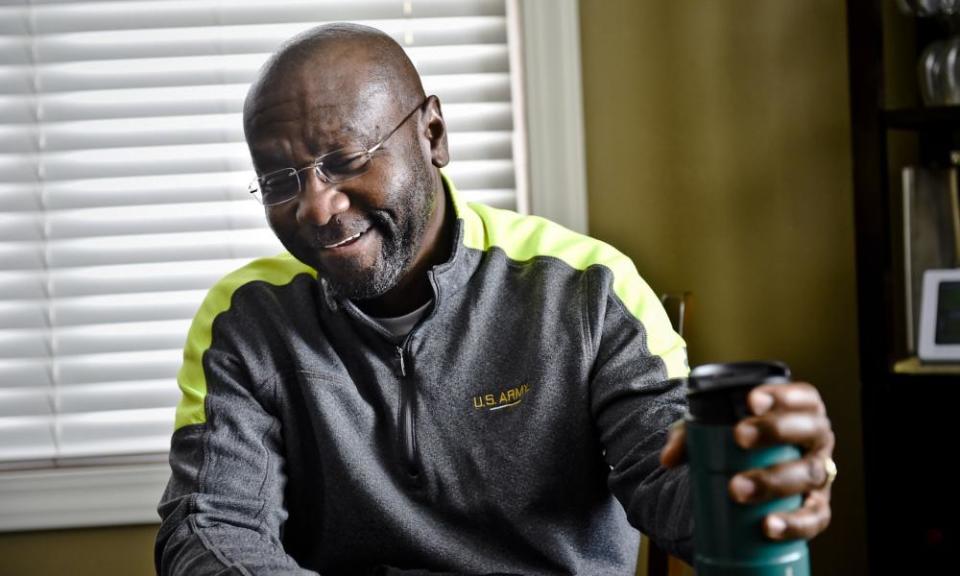Montana's first black mayor, once a refugee, says US offered 'second chance'

Wilmot Collins didn’t leave Liberia until he was 31, but his is now the most American of stories.
On Tuesday, the 54-year-old former refugee of a civil war, community activist and progressive political newcomer who wants affordable housing and solutions for teen homelessness, was elected mayor of Helena, Montana’s capital. It’s a historic feat that turned heads around the country; he is believed to be the first black man elected mayor since Montana became a state.
In an interview Wednesday, Collins said he didn’t envision a future in politics when he was petitioning for US refugee status more than two decades ago, working to join his wife who moved to Montana two years ahead of him to study.
“I never thought about it,” said Collins, exhausted but exhilarated. “My only thing was, I hope they can give me a second chance. That’s all I needed. This country and this state and this city provided me a second chance.”
Collins turned his second chance into a history-making moment and unseated a four-term incumbent who had dragged his feet on dealing with the Pacific north-west’s only Confederate monument.
As with all firsts, there are caveats. According to the Montana Historical Society, Helena had one black mayor before Montana was a state. The African American barber ET Johnson was elected Helena mayor 16 years before statehood and before Helena was incorporated as a city.
Montana is not the whitest state in America; nearly 7% of its 1 million residents are Native American. But it is by far the least black, ranking dead last, with less than one percent of the state’s residents being African American.
That, coupled with reputational stains like the white supremacist Richard Spencer’s short-term, but exceptionally high-profile residency in the north-west of the state, led to a collective gasp nationwide on news of Collins’ election.
There’s some misunderstanding of the place, however. Helena, once a rowdy gold-mining boomtown in the Rockies, is now a solidly left-leaning seat of government.
For Collins, like most Montanans, the reality of life is mundane.
“It tells you that the people of Helena were more focused on their own issues and it was not about race or anything,” said Collins, who went door-to-door, campaigning at hundreds of homes in Helena. “They were looking for a change and I came in at the right time. I spoke the language they were looking for.”
Specifically, Collins ran in the midst of a furor over Confederate monuments and an onslaught nationally of disinformation over refugees like himself. In his campaign, he addressed both issues head-on. As a refugee who underwent the difficult vetting process, he used campaigning to dispel myths.
The monument topic is complicated, since Montana didn’t become a state until long after the civil war ended. The Daughters of the Confederacy erected a fountain in Helena in 1915, and its racist history was lost on most residents.
Two years ago, the city commission opted to install a plaque explaining the troubled past of the fountain, but Mayor Jim Smith opposed the change. The battle escalated, until the city removed the fountain in August when it became clear it would grow to be a draw for white nationalists. Smith was not available for comment on Wednesday, but his foot-dragging was widely criticized and probably helped lift Collins to victory.
“It showed to me that when our elected officials aren’t willing to take stands, they’re going to face criticism from the community either way,” said Rachel Carroll Rivas, co-director of the Montana Human Rights Network.
Helena’s mayoral race was just one of many remarkable outcomes in local elections across the US on Tuesday, one year after Donald Trump shocked the country by getting elected president. Thought it’s unclear how many of the surprises were in direct response to Trump, many are reading that message in the results.
Democrats swept to victory in gubernatorial races in Virginia and New Jersey, and are poised take control of the Virginia general assembly.
In Minnesota, St Paul elected its first African American mayor, while Minneapolis elected an openly transgender woman – the first for a major American city council. Virginia elected its first openly transgender lawmaker, who unseated the author of an anti-trans bathroom bill.
In Atlantic City, New Jersey, a woman outraged over a male legislator’s sexist joke ran against him and won his seat. And in both New Jersey and Virginia, voters elected the states’ first African American lieutenant governors.
Helena’s mayoral election wasn’t a partisan affair. But Collins and two newly elected members of the city commission took the unusual step of running as a progressive slate – pledging to work together on specific issues.
Maybe the biggest takeaway from Tuesday’s results is that upstart newcomers can win. Collins, who works in child protective services, has never run for office before. He was inspired by the message of last year from Barack Obama, who repeatedly urged Americans to stop complaining and get involved in the process.
In spite of all the rhetoric, he said, this is not Trump’s America.

 Yahoo News
Yahoo News 